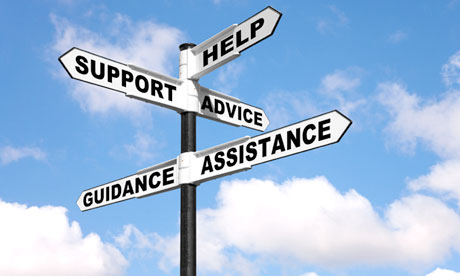

"You can only help those who first help theirselves." - From Drugs To Dreams
Source: From Drugs To Dreams Author: Mike
You walk out the door. You can feel the warmth of the sun and you begin to look around and take in the world with sober eyes. You have completed your rehabilitation program, beat relapse, (which seemed impossible), and made some new acquaintances. Then it hits you and sometimes down right scares you; "So what now?"
How do you manage to stay clean and live in life-long recovery?
1. SUPPORT
Recovery is a lifelong battle. It is one of the hardest things you will face as an addict. Being committed to recovery is the first step but, even with commitment, you can’t do it alone. Every addict in recovery needs support, someone to hold them up when they are too tired to keep going. Someone who can remind them recovery is worth it. Support can come in many forms. It can be family, friends, recovering addicts, or the acquaintances that develop from attending NA, AA or other recovery events.
Social media and the internet are starting to change the way support in recovery can be utilized. There are crisis hotlines, blogs, Facebook groups and pages and website after website bringing addicts from all over the world together. Online meetings through Skype or Smart phone apps are starting to become more popular and more prevalent. Google can be your biggest resource, if need be. Not everyone you ask will support you, or support you right away.
Think about the pain that you have caused friends and family. It may be a while before they trust that you will not hurt them again. Until then, things can be rough. Out of everything you can surround yourself with, however, there should be one central person that you can rely on to help you through your recovery. That leads me to the next point.
2. SPONSORSHIP IS IMPORTANT.
“I know how you feel; it will be ok”. Those nine words can be the most frustrating words you will hear throughout the recovery process. Why? Because there will be a lot of people that do not know how you feel. They will say this, because they feel bad saying “I do not know what to say.” Because through no fault of their own, they do not know what to say.
A sponsor, however, is a person with multiple years of recovery. They have succeeded on the path that you have just started to walk and they really DO know how you feel. Events in your life may have unfolded differently, but the struggle of recovery will always be a common bond.
I have been asked by many addicts just getting into recovery – “Why does my sponsor have to be of the same sex?” Traditionally, it is suggested that your sponsor is of the same sex as to avoid any emotional or physical situations that could cause you to stray from your primary focus of staying sober. The world is changing, however, and so are the people in it. Gender is becoming a hot topic, primarily fueled by gender identification of one’s self. Transgender and same sex couples are becoming more prevalent and open. If you are someone attracted to the same sex, then would it be wise for you to have a sponsor of the same sex, if the traditional reason of not having a same sex sponsor is to prevent emotional and physical situations from happening?
I answer it this way. Everyone is different, as is their recovery. I do not feel that the sex of your sponsor matters nearly as much as the experience and the help that they can offer you. My sponsor is a woman and, to be honest, she is the most effective sponsor I have had since my recovery began 12 years ago. Untraditional? Sure, but I did what I felt was best for my recovery.
If you choose to go against tradition, just be mindful of the fact that any kind of romantic relationship can be dangerous when it comes to staying sober. The goal of a sponsor is to be there for you as much as they can through the 24 hours of the day. They are there to help you with cravings, through hard times, and to remind you why you are in recovery when you want to give up. They are there to walk you through your steps of recovery.
3. STEPS OF RECOVERY
The 12 Step Program. You hear it on TV, on the streets, in rehab, in meetings and numerous other places. The words “Alcoholic” and “Addict” instantly spur the thought of 12 Steps. Why shouldn’t they? The 12 Steps have proven to be effective and are an excellent way to help you walk through your recovery. There are the addicts, however, that give the steps no credence and ones who felt they just didn’t work. There are alternative forms of recovery and no addict should be faulted for trying something that they think will work better for them.
In my opinion, the reason behind the steps was to give an otherwise lost and confused addict something to work for, something to achieve, even a small piece of hope that they can hold on to. That, to me, is the important part. I have not come across many addicts who stayed in recovery just by doing it. “Working your recovery” is a true statement and something that you will have to do for the rest of your life. So whether it is the traditional steps or something 100% tailored towards you, make some life changing goals and work through them with your sponsor.
4. COUNSELING
This tends to be one of the harder processes to accomplish for most recovering addicts. Fresh out of rehab, most addicts do not have the financial means to afford counseling. This is where medical insurance needs to step in, but that is a debate all of its own. There are programs in place to assist you in finding affordable or no charge counseling, but there are a lot more addicts then the programs can handle. If you have no way of receiving counseling right away that is understandable, but it does not make it any less important.
Why did you use? Most of us will answer that question with “to escape pain, to escape reality, to run from something terrible in their life.” Our drug/drink of choice was the avenue we used and our addition took over from there. Now that you are in recovery, you need to fix what made you use the first time and that is not the only thing that you are going to need to work through.
Addiction can cause depression, PTSD, trust issues and sometimes even physical or mental damage and that is just to name a few of the complications it gives you. I have seen many addicts try to do it all on their own and have seen almost all of them lose their recovery, or worse, lose their life. You can only hold it in so long before you just can’t take it anymore. And like the first time, you are falling down the rabbit hole. Your entire life fell apart and you cannot fully put it back together without putting yourself back together.
5. DISASSOCIATION
This seems to be one of the hardest things for recovering addicts. The idea of coming out of rehab and removing people from your life is not an easy one. It is however, an important one. It is almost impossible to stay sober when you are associating with addicts who are not in recovery. Anyone that is not in recovery needs to be cut out of your circle. Sometimes it sucks, but it really is what is best for you and your recovery. If they were true friends, they will understand. If they weren’t, why would you want them around anyway?
Yes, disassociation also encompasses relationships. Relationships and recovery are a double edged sword and a hot topic. Being in a relationship in the beginning of recovery can backfire very quickly. You are trying to learn how to live life without drugs, put your life back together and heal yourself emotionally. Do you really want to add on the stress of a relationship?
Now imagine someone who is in the same situation as you. Do you really think you both can handle it? Or what if your partner is an active addict? Do you really think you can resist the urge to use when it is in front of you every day?
That’s not to say that relationships are strictly forbidden. Situations need to be taken in to account for each individual. Getting out of rehab and ending your 30-year marriage is probably not the greatest thing you can do, especially if your partner is loving and supportive. That is just one example of numerous reasons why some addicts just simply cannot head the no relationship suggestion.
If you do find yourself in that situation here is some advice that I have used for my very own Sponsees:
1. Your partner needs to understand that your recovery comes first and that steps should be put in to place so you both can heal. If you do not heal you can’t be the partner that you need to be.
2. You should both be in counseling individually and, if you want, as a couple.
3. Consider getting your partner an Al-Anon or Nar-Anon sponsor, or at least into some meetings. It is a lot easier to deal with the entire situation if they do not feel alone. Having someone to talk to, someone that understands what they are going through can go a long way.
4. Remember, addiction is a family disease and the entire family needs to heal, not just you.
If you were not in a relationship before rehab, it is best to not get involved with someone until you have worked through some of the initial steps of your recovery. The general rule of thumb is a year. You fought your ass off to get sober and start your new life. Do you really want to risk starting over?
Most important – Be proud of yourself. You escaped death and beat your addiction. Never forget where you were and use it to bring yourself to where you want to be. Your life is what you make of it, so go make something of it.
Life in recovery is beautiful and all the effort really is worth it.
From Drugs To Dreams
Our Stories
Daily Struggle
Share this:
- Click to share on Twitter (Opens in new window)
- Click to share on Facebook (Opens in new window)
- Click to email a link to a friend (Opens in new window)
- Click to share on Pocket (Opens in new window)
- Click to share on Reddit (Opens in new window)
- Click to share on Pinterest (Opens in new window)
- Click to share on Tumblr (Opens in new window)
- Click to share on LinkedIn (Opens in new window)
- Click to print (Opens in new window)